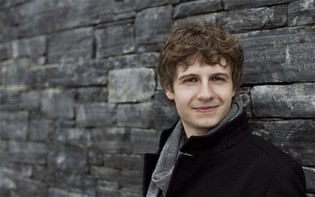 Russian pianist Pavel Kolesnikov.
Russian pianist Pavel Kolesnikov. However, there was more to this concert than “a good time had by all.” It was also a vehicle for two young musicians – pianist Pavel Kolesnikov and Earl Lee, the TSO’s Resident Conductor – to show what they can do.
At 26 years of age, Kolesnikov is already internationally known. In his native Russia, he picked up a special jury prize at the Tchaikovsky Competition. In the UK (where he now lives) he was named one of the BBC’s “new generation artists.” In Canada, he is perhaps best known as the laureate of the 2012 Hohnens Competition, in Calgary.
On this occasion, Kolesnikov signed up to play Rachamaninoff’s Rhapsody on a Theme by Paganini. He proved himself entirely equal to the task, which he approached as a serious artist, not a razzle-dazzle showman. Throughout, his playing was agile and dexterous. To be sure, there was enough power in his power-chords, and enough flash in his flashy octaves – but he was sparing in his use of bravura, preferring instead a continuous, organic, ebb and flow. His big solo moment – Variation 18 – was warm and sensitive.
Kolesnikov found a reliable ally in the 32-year-old Lee, who, from the podium, matched the pianist’s thoughtful approach.
Indeed, throughout the entire program, the Korean-born Torontonian proved himself to be a musical enabler. His baton style is neat, tidy and precise. In the two overtures – Berlioz’s Le Corsaire and Mozart’s Magic Flute – Lee excelled at balance and effectively terraced dynamics. And in Debussy’s Après-midi d’un faun, he followed an intelligent grande ligne from beginning to end. That said, the piece might have benefited from a more spontaneous reading (while still retaining the grande ligne).
Finally, in the Carmen Suite (extracted from Bizet’s opera by Ernest Guiraud) the TSO’s playing was lively and colourful. Lee’s long, gradual accelerando in the final movement (the “Danse Bohème” from Act II) was an exciting touch.
© Colin Eatock 2016
 RSS Feed
RSS Feed

